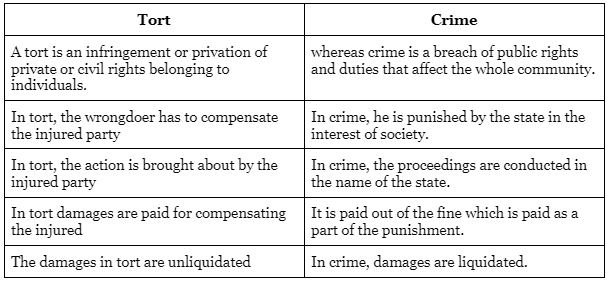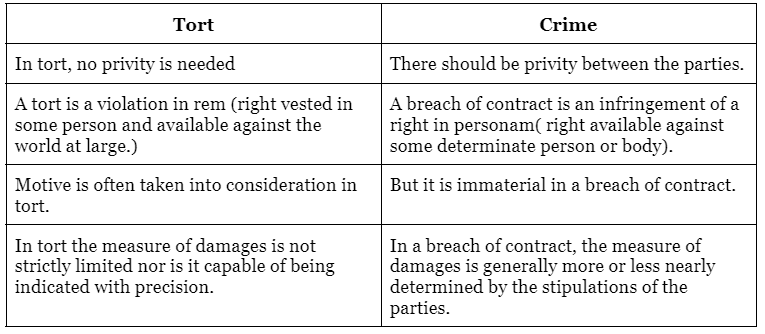Tort, Crime and Contracts | Legal Reasoning for CLAT PDF Download
Introduction
- In a general sense, the wrongs, which are less serious in nature, are categorized as private wrongs and have been grouped as civil wrongs.
- On the other hand, wrongs, which have more serious effects, are termed as public wrongs and fall under the group of crimes. A crime affects the whole community, but, tort violates individual rights.
- In a case for tort, the injured party has to file a suit as the plaintiff. In criminal litigation, however, the criminal proceeding against the accused is initiated by the State.
- Further, the law does not permit a settlement between the accused and the victim in a criminal proceeding (except in a few cases) At any time in a suit for tort, there can be a settlement by and between the parties and as a consequence, the said suit can be withdrawn.
- A tort can also be distinguished from a crime by the final award of the concerned court. In tort, the injured party is awarded compensation, whereas, in a criminal case, the accused is awarded punishment.
- At times, an act may constitute both a tort as well as a crime. The remedies available in such instances are not alternative, but concurrent.
- Though there are multiple features that distinguish a crime from a tort, there exists one basic similarity between the two as well. It is the primary duty not to commit an offence.
Distinction between Tort and Crime

Tort and Contract
- The definition given by P.H. Winfield clearly brings about the distinction between tort and contract.
It says, Tortuous liability arises from the breach of a duty primarily fixed by law; this duty is towards persons generally and its breach is redressible by an action for unliquidated damages.
A contract is a species of agreement whereby a legal obligation is constituted and defined between the parties to it.
It is a legal relationship, the nature, content and consequence of which are determined and defined by the agreement between the parties.
According to Salmond, a contract arises out of the exercise of the autonomous legislative authority entrusted by the law to private persons to declare and define the nature of mutual rights and obligations.
In the present day, tort and contract are distinguished from one another in that, the duties in the former are primarily fixed by law while in the latter they are fixed by the parties themselves.
The agreement is the basis for all contractual obligations. “People cannot create tortious liability by agreement.
Thus I am under a duty not to assault you, not to slander you, not to trespass upon your land because the law says that I am under such duty and not because I have agreed with you to undertake such duty.

Eg. a manufacturer of ginger beer had sold to a retailer, ginger beer in a bottle of dark glass. The bottle, unknown to anyone, contained the decomposed remains of a snail that had found its way to the bottle at the factory.
X purchased the bottle from the retailer and treated the plaintiff, a lady friend (the ultimate consumer), to its contents. In consequence partly of what she saw and part of what she had drunk, she became very ill. She sued the manufacturer for negligence.
This was, of course, no contractual duty on the part of the manufacturer towards her, but a majority of the House of Lords held that he owed a duty to take care that the bottle did not contain noxious matter and that he was liable if that duty was broken.
Tort and Quasi-Contract
- Quasi-contracts cover those situations where a person is held liable to another without any agreement, for money or benefit received by him to which the other person is better entitled.
According to the Orthodox view, the judicial basis for the obligation under a quasi-contract is the existence of a hypothetical contract that is implied by law. But the Radical view is that the obligation in a quasi-contract is sui generis and its basis is the prevention of unjust enrichment.
- Quasi-contracts resemble tort and differ from contracts in one aspect. The obligation in quasi-contract and in tort is imposed by law and not under any agreement. In yet another dimension quasi-contract differs from both tort and contract.
- If, for example, A pays a sum of money by mistake to B. in Quasi contract, B is under no duty not to accept the money and there is only a secondary duty to return it.
- While in both tort and contract, there is a primary duty the breach of which gives rise to the remedial duty to pay compensation.
|
63 videos|172 docs|37 tests
|
FAQs on Tort, Crime and Contracts - Legal Reasoning for CLAT
| 1. What is the difference between tort, crime, and contracts? |  |
| 2. Can a single action be both a tort and a crime? |  |
| 3. What are the essential elements of a contract? |  |
| 4. What is the difference between an express and implied contract? |  |
| 5. What remedies are available in case of a breach of contract? |  |
















